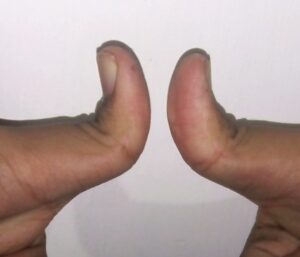Hitchhiker’s Thumb Trait Calculator
Select each parent's genotype to predict the likelihood of your child having a hitchhiker’s thumb.
Explore the Hitchhiker’s Thumb Trait Calculator to estimate the probability of your child inheriting the backward-bending thumb trait. Also known as distal hyperextensibility, this characteristic is frequently cited in genetics as an example of inheritance — an intriguing complement to your Punnett Square Calculator collection.
What Is Hitchhiker’s Thumb?
Hitchhiker’s thumb refers to a thumb that can bend backward at a roughly 90° angle or more, resembling a hitchhiker’s gesture. While harmless and painless, it’s often used in genetics examples due to its apparent simple inheritance pattern.
Key facts:
- Affects approximately 25–35% of people in global studies.
- Often attributed to a recessive allele, though genetic complexity exists.
- Studies confirm thumb flexibility is actually a continuous trait, not strictly binary.

Genetics at a Glance
In the simplified model used here:
| Genotype | Phenotype |
| TT or Tt | Normal thumb (no hyperextension) |
| tt | Hitchhiker’s thumb (hyperextensible) |
The trait behaves recessively, so only those with two copies of the t allele exhibit the hyperextensible thumb.
How the Calculator Works
- Choose both parents’ genotypes: TT, Tt, or tt.
- The calculator runs a Punnett Square simulation (4 combinations).
- It displays the percentage likelihood of children inheriting:
- Normal thumbs (TT or Tt)
- Hitchhiker’s thumbs (tt)
Example:
- **Parent 1 = Tt**, Parent 2 = tt
→ 50% chance of tt/hitchhiker’s thumb
→ 50% chance of Tt/normal thumb.
Educational Value
This tool is ideal for:
- Teaching basic recessive inheritance with visual Punnett Squares.
- Students exploring genetic probability in biology classes.
- Families curious about inherited features.
- Anyone interested in observing how traits are passed down.
FAQs
Can two normal-thumbed parents have a hitchhiker’s thumb child?
Only if both are heterozygous carriers (Tt) — giving a 25% chance of tt.
Can two hitchhiker-thumb parents have a normal-thumb child?
No — tt × tt always produces tt offspring.
Is this trait always inherited recessively?
Historically, yes — but studies show thumb flexibility is continuous and polygenic, not strictly single-gene . This tool uses the classical model for simplicity.
Conclusion
The Hitchhiker’s Thumb Trait Calculator brings real-world genetics into focus. It offers a clear, visual way to learn recessive inheritance while acknowledging biological nuance. Engage in learning by simulating your own or your family’s genetic traits today!
